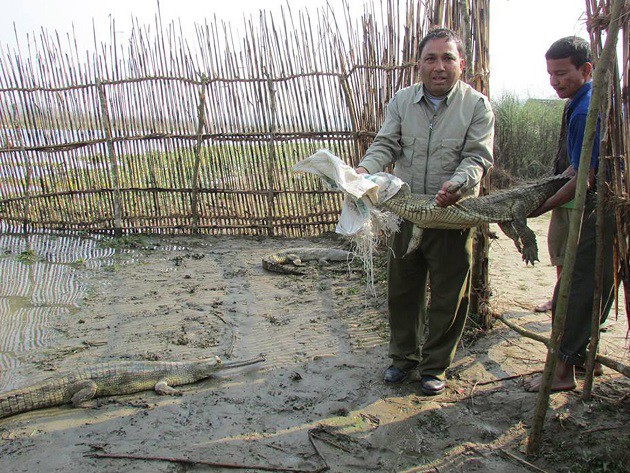CNP releases 1,226 gharials into various rivers, challenges still loom for its conservation
 Chitwan / March 3: The Chitwan National Park (CNP) has so far released 1,226 crocodile hatchlings of gharial species (gavialis gangeticus) into various rivers since 1981.
Chitwan / March 3: The Chitwan National Park (CNP) has so far released 1,226 crocodile hatchlings of gharial species (gavialis gangeticus) into various rivers since 1981.
Eggs of this aquatic reptile collected from the banks of different rivers were brought to the Crocodile Breeding Centre based in Kasara along the park territory for hatching and grown up babies were released into different rivers.
The centre was established in 1978 to make efforts to conserve this water animal and increase its population as well. The centre in the period of three and half decades discharged 546 crocodiles to the Rapti River, 399 to Naryani, 35 in Kaligandaki, 95 in Karnali and 110 in the Babahi, according to CNP assistant conservation officer Bed Bahadur Khadka.
Of late babies crocodiles are released only into Rapti River as this reptile is found not much secured in other rivers, Khadka said.
A total of 170 crocodiles were released in the Rapti River in two years. Presently there are around 600 crocodiles including 13 mothers in the centre.
Crocodile habitats in the country are becoming polluted, posing a great threat to its life. Crocodiles easily migrating to India with the flow of water is one of the reasons behind its decreasing number in the rivers here, CNP Chief Conservation Officer Ramchandra Kandel said.
A baby crocodile needs around 200 kilometers of river area for fun and Nepal rivers do not have sufficient space for the same and crocodiles of Nepal –based rivers prefer to move to India in want of proper habitat.
We believe that of the babies crocodiles the CNP have so far released into rivers here, 75 per cent moved to India.
Human encroachment on crocodile habitats has challenged the efforts to conserve this aquatic reptile and increase its population, Kandel added. Fishing and ongoing quarrying of river products have made the crocodile habitats unsafe.
Nepal declared the gharials also known as fish- eating crocodiles as the endangered marine species in 2007. RSS
